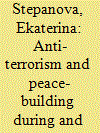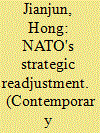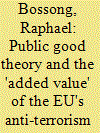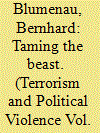| Srl | Item |
| 1 |
ID:
053878


|
|
|
|
|
| Publication |
Stockholm, SIPRI, 2003.
|
| Description |
iv, 50p.
|
|
|
|
|
|
|
|
|
|
|
|
Copies: C:1/I:0,R:0,Q:0
Circulation
| Accession# | Call# | Current Location | Status | Policy | Location |
| 046728 | R 327.172/STE 046728 | Main | On Shelf | General | |
|
|
|
|
| 2 |
ID:
084194


|
|
|
| 3 |
ID:
047943


|
|
|
|
|
| Publication |
London, Pan Books, 2000.
|
| Description |
x, 214p.,figure
|
| Standard Number |
0330367250
|
|
|
|
|
|
|
|
|
|
|
|
Copies: C:1/I:0,R:0,Q:0
Circulation
| Accession# | Call# | Current Location | Status | Policy | Location |
| 043483 | 355.5/DAV 043483 | Main | On Shelf | General | |
|
|
|
|
| 4 |
ID:
089827


|
|
|
|
|
| Publication |
2009.
|
| Summary/Abstract |
In April 2009, the NATO Strasbourg-Kehl Summit adopted a series of joint declarations and strategic plans, demostrating that NATO is entering a new round of military-political strategic adjustment. NATO's new strategic direction has been motivated by various internal and external factor, including the pressure of the new international environment, the Obama administration's desire to upgrade strategic cooperation with its allies, the major European states represented by France and Germany seeking to strenthen the European pillar within NATO, and the urgent need to readjust NATO's external relations.
|
|
|
|
|
|
|
|
|
|
|
|
|
|
|
|
| 5 |
ID:
120832


|
|
|
|
|
| Publication |
2013.
|
| Summary/Abstract |
This contribution analyses the EU's fight against international terrorism from the perspective of public goods theory. The first part develops an improved conceptualisation of collective action problems in this issue area, and presents a typology of related security goods according to different aggregation technologies (weaker links, summation, better shots). The second part embeds this theoretical framework in the European context, and presents an empirical survey of the EU's anti-terrorism efforts. It is argued that the EU has been comparatively effective in responding to 'weaker' link vulnerabilities, even if implementation records are uneven and boundaries of security cooperation remain unclear. In contrast, the EU could not effectively aggregate resources and act jointly in the international fight against terrorism. Due to the non-excludable nature of benefits (as in the case of foreign policy) or partial rivalry of consumption (as in the case of sensitive information), concerns with free-riding and crowding remain significant obstacles to collective action. Finally, the EU increasingly supports better shot efforts to develop new instruments and technologies to combat terrorism, but may be left behind by mini-lateral initiatives of its most capable member states.
|
|
|
|
|
|
|
|
|
|
|
|
|
|
|
|
| 6 |
ID:
138786


|
|
|
|
|
| Summary/Abstract |
In the 1970s, Western European countries were hit hard by terrorism, especially by international terrorism that crossed borders easily and allowed terrorists of different origins to carry out attacks against both governments and people. Consequently, the necessity of fighting this menace also extended to international organisations. This article looks at how the Council of Europe dealt with the issue, and assesses the negotiations that led to the Convention on the Suppression of Terrorism from the German perspective. West Germany was very interested in establishing a sounder international legal framework against terrorism and thought that the Council of Europe would be able to make an important contribution by abolishing the political offence exception that had so far been a core feature of most extradition treaties. This clause allowed political criminals to escape punishment by fleeing to a country that would deny extradition to a different country on the grounds of the political nature of the act committed by the person in question. The article gives an account and analysis of the complex negotiations that finally resulted in the adoption of the Convention in 1977, as well as of the problems encountered and compromises reached during these negotiations.
|
|
|
|
|
|
|
|
|
|
|
|
|
|
|
|